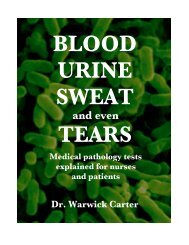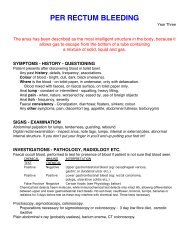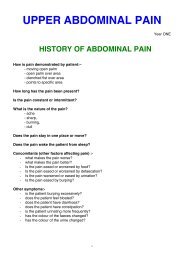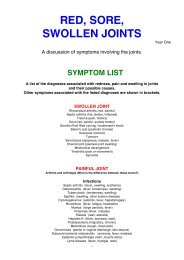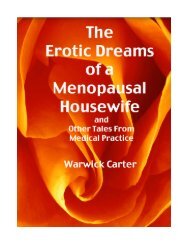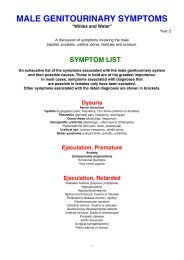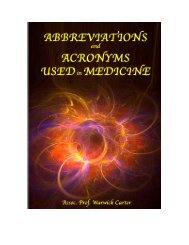Menopause A to Z.pdf - Medwords.com.au
Menopause A to Z.pdf - Medwords.com.au
Menopause A to Z.pdf - Medwords.com.au
You also want an ePaper? Increase the reach of your titles
YUMPU automatically turns print PDFs into web optimized ePapers that Google loves.
MENOPAUSE A <strong>to</strong> Z<br />
The only practical treatment for polymenorrhoea is the oral contraceptive pill, as this can hold the hormone levels at<br />
an artificially high level until the period is desired (usually every 28 days). If the woman objects <strong>to</strong> the use of the pill,<br />
other hormones may be used, but they are not generally as effective.<br />
See also OVARY; PITUITARY GLAND<br />
MENSTRUAL PERIODS HEAVY<br />
Excessive blood loss during a menstrual period (menorrhagia or flooding) is un<strong>com</strong>fortable, distressing and may<br />
lead <strong>to</strong> anaemia and other health problems. In most women it is a constitutional problem in that there is no specific<br />
disease or condition c<strong>au</strong>sing the problem, but it is the way that their body deals with the monthly hormonal changes. In<br />
a few cases though, there is an underlying medical problem. This is more likely if the periods have changed <strong>to</strong> be<strong>com</strong>e<br />
heavier over a few months.<br />
The menop<strong>au</strong>se occurs in the late forties and early fifties in most women. Instead of cycling smoothly and evenly<br />
through the monthly changes, sex hormone (oestrogen and proges<strong>to</strong>gen) levels start <strong>to</strong> change suddenly, irregularly<br />
and inappropriately. This c<strong>au</strong>ses the symp<strong>to</strong>ms of menop<strong>au</strong>se which include irregular menstrual periods that can vary<br />
from very light <strong>to</strong> very heavy, hot flushes, headaches, irritability, personality changes, breast tenderness, tiredness and<br />
pelvic dis<strong>com</strong>fort.<br />
Inappropriately high levels of oestrogen being prescribed for hormone replacement therapy may c<strong>au</strong>se heavy<br />
periods.<br />
Psychological disturbances (eg. severe stress, shock or anxiety) may affect oestrogen production and irregular<br />
heavy periods may follow.<br />
Intr<strong>au</strong>terine contraceptive devices (IUD) may irritate the lining of the uterus <strong>to</strong> c<strong>au</strong>se heavier and more painful<br />
periods in some women.<br />
Other c<strong>au</strong>ses of menorrhagia include fibroids (hard balls of fibrous tissue that form in the muscular wall of the<br />
uterus), cysts in an ovary, ulcers and erosions of the cervix (opening of the uterus in<strong>to</strong> the vagina), endometriosis, a<br />
miscarriage (may c<strong>au</strong>se abnormal bleeding before a woman is aware that she is pregnant), an ec<strong>to</strong>pic pregnancy<br />
(development of a growing foetus in the fallopian tubes instead of the uterus), salpingitis (infection of the fallopian<br />
tubes), hypothyroidism (an underactive thyroid gland) and tumours, polyps or cancers of the uterus or cervix may<br />
c<strong>au</strong>se irregular heavy bleeding, that may not be related <strong>to</strong> the menstrual cycle, but be c<strong>au</strong>sed by direct bleeding from<br />
the growth.<br />
Un<strong>com</strong>mon c<strong>au</strong>ses include the Stein-Leventhal syndrome (multiple cysts in the ovaries affect their function) and<br />
thrombocy<strong>to</strong>penia.<br />
See also MENSTRUAL PERIODS PAINFUL; VAGINAL BLEEDING ABNORMAL<br />
MENSTRUAL PERIODS, LACK OF<br />
Women expect their menstrual periods <strong>to</strong> occur regularly every month, and be<strong>com</strong>e concerned when this does not<br />
happen. The obvious c<strong>au</strong>ses for periods <strong>to</strong> s<strong>to</strong>p are pregnancy and menop<strong>au</strong>se, and every woman between 15 and<br />
50 who misses a period should be considered pregnant until proved otherwise. Breastfeeding will delay the return of<br />
regular menstrual periods. There are also a number of medical conditions that may be responsible for amenorrhoea (a<br />
lack of menstruation) or oligomenorrhoea (infrequent menstruation).<br />
Any significant emotional tr<strong>au</strong>ma (eg. loss of job, death in family), physical stress (eg. vigorous athletic training),<br />
serious illness (eg. major infection) or poor nutrition (eg. lack of food, vomiting and diarrhoea) can affect the menstrual<br />
cycle. This is a very <strong>com</strong>mon phenomenon.<br />
Significant weight loss as a result of deliberate dieting, disease (eg. cancer) or psychiatric disturbance (eg. anorexia<br />
nervosa) will also s<strong>to</strong>p menstruation.<br />
The oral contraceptive pill may c<strong>au</strong>se menstrual periods <strong>to</strong> be<strong>com</strong>e lighter and lighter until they disappear<br />
<strong>com</strong>pletely. Some women take the pill constantly, without a monthly break off the pill or taking sugar tablets, and s<strong>to</strong>p<br />
their periods for the sake of convenience. This practice is <strong>com</strong>pletely safe and c<strong>au</strong>ses no long-term harm.<br />
Un<strong>com</strong>mon c<strong>au</strong>ses include tumours, cysts or cancer in an ovary that affect the regular cyclical production of<br />
oestrogen, a lack of thyroxine (hypothyroidism), Asherman syndrome, Addison's disease and the Stein-Leventhal<br />
syndrome.<br />
See also MENSTRUAL PERIODS<br />
MENSTRUAL PERIODS PAINFUL<br />
In more than 8 out of 10 cases, there is no serious c<strong>au</strong>se for painful periods (dysmenorrhoea). Although distressing,<br />
they are merely the way in which a woman, and her uterus, copes with menstruation.<br />
The uterus mainly consists of powerful muscle fibres, which should only <strong>com</strong>e in<strong>to</strong> use during the delivery of a baby,<br />
and <strong>to</strong> a minor extent when blood and the unused lining of the uterus is expelled in the monthly menstrual period.<br />
Period pain is usually c<strong>au</strong>sed by excessive spasms of these muscles in the uterus, but sometimes may be due <strong>to</strong> other<br />
medical problems.<br />
31



